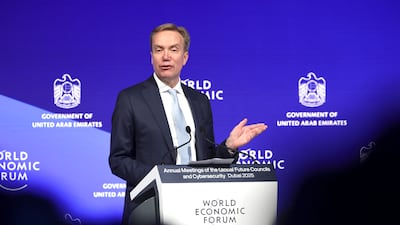Too few nations are financially prepared to handle the next major economic shock, the head of the World Economic Forum has warned.
Borge Brende said decision-makers must find a way to return to an average global economic growth rate of four per cent, up from the current three per cent.
“There will always be bubbles. One has to be conscious of how to deal with it,” the forum's president and chief executive told the Annual Global Future Councils meeting in Dubai, a precursor to Davos.
Many governments are saddled with high debt and don't possess the necessary “ammunition” for the next recession, he said.
Mr Brende spoke days after a Wall Street sell-off when US President Donald Trump threatened an extra 100 per cent tax on Chinese imports.
The Trump administration spent the weekend trying to roll back the comments, but it rattled investors and raised fresh fears of an overvalued US stock market and an AI bubble ready to burst.
“The highest tariff we face today is uncertainty, and in addition, high debt and unsettled trade are adding to this challenge,” said Mr Brende.
“Countries really need to get their houses in order by focusing on domestic policy changes.
“Reforms cannot wait. Fiscal consolidation is a must. If you don't, and the shock comes, and it will, you don't have any ammunition to fight a potential recession. And then you're in a really bad place.
“The reason why we came through the great financial crisis in 2008, the reason why we came through also Covid, was that they did have fiscal ammunition to make sure it didn't end in a depression.
“We cannot predict the future, but we have no excuse not to prepare.”
Mr Brende further said that artificial intelligence would inevitably disrupt jobs in the next few years.
“We will figure out completely new things to do,” he said, adding that it would take ingenuity and governments working together.
Ohood Al Roumi, Minister of State for Government Development and the Future, said young developing countries such as the UAE were embracing the new digital world with humans at the heart of technology.
“It requires human-centred design and new skills across society to realise its full potential,” she said.
“New generations born in a digital world” had to be at the heart of development, and that the “future cannot be designed without the generations of tomorrow”, said Ms Al Roumi.
The UAE has invested substantially in AI technology and views it as a key pillar of the future economy.



